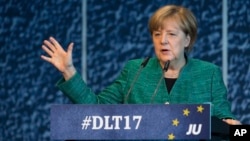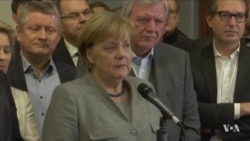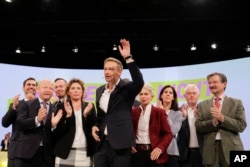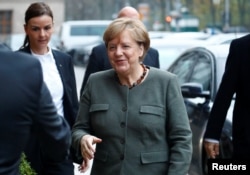Germany — the most stable European Union country — was plunged into a political crisis Monday. Weeks-long exploratory talks over forming Germany’s next coalition government collapsed with all four parties involved at loggerheads over migration and energy policies as well as on further European Union integration.
Chancellor Angela Merkel was due Monday to meet the country’s president, but it remained unclear whether she will try to run a minority government, forestalling a snap parliamentary election, or recommend heading to the polls early next year.
The news of the collapse of the talks sent the euro sliding in overnight Asian markets both against the dollar and the Japanese yen. Merkel’s difficulties come at a crucial time for the EU, which is locked in increasingly vitriolic negotiations with Britain over Brexit.
The German Chancellor had been trying to forge a complicated coalition between her Christian Democratic Union (CDU), its Bavarian sister party the Christian Social Union (CSU), the pro-business Free Democratic Party (FDP) and the Green party following federal elections at the end of September. Those elections left her ruling CDU the largest party but with a reduced share of the vote and fewer seats — thanks partly to a surge by Germany’s far-right populists.
Watch related video by Henry Ridgwell:
CDU officials acknowledge that migration — the issue the populists of the Alternative for Germany built their election appeal on — was the main obstacle in the talks dividing potential partners in a so-called Jamaica coalition, nicknamed because the parties’ traditional colors are similar to the Jamaican flag.
Asylum-seekers
The question of how many of the 1.2 million migrants and asylum-seekers from the Middle East and Africa who found their way to Germany in 2015 and 2016 should be allowed to be reunited with their families couldn’t be resolved in the coalition negotiations. On Sunday, the Green party offered a compromise whereby they would agree to limit Germany’s annual intake of migrants to 200,000 – as long as the other parties didn’t rule out that relatives of migrants already in Germany would be allowed to join them.
With migration such a contentious issue — and with the possibility of snap elections — the CDU, the CSU and the Free Democrats have appeared determined to outdo each in proposing tougher migration controls.
Merkel, Europe’s longest-serving leader, is facing renewed internal criticism of her handling of the coalition talks. As the negotiations dragged she cut a rather passive figure, according to party critics. On Sunday the embattled Chancellor said she regretted the collapse of the talks, but added she had “thought we were on the path where we could have reached agreement” when the Free Democrats decided to withdraw.
“It is at least a day of deep reflection on how to go forward in Germany,” Merkel said. “But I will do everything possible to ensure that this country will be well led through these difficult weeks.”
Falling apart
Announcing the pull-out from the talks, the FDP leader Christian Lindner, argued, “it is better not to govern than to govern wrongly.” He suggested the huddles between officials had become acrimonious, complaining, “there was no process but rather there were setbacks because targeted compromises were questioned.”
The Free Democrats and Greens also clashed repeatedly over climate-change issues and the use of coal-fired energy generation.
Social Democrat leader, Martin Schulz, whose party had been a junior coalition partner to Merkel for the last four years, Sunday once again ruled out the possibility of another so-called grand coalition between the CDU and his party, the second largest in the Bundestag. “The voter has rejected the grand coalition”, Schulz said at a party conference in Nuremberg.
With the Social Democrats refusing to enter another coalition with Merkel following their disastrous showing in the September election, the Chancellor now faces a bleak choice. She can either try to form a minority government with the Free Democrats that would be at risk of being out-voted regularly, or concede that a re-run of September’s election is necessary. Most opinion polls suggest a re-run election would produce a very similar result to September’s.
But calling a snap election risks ending Merkel’s career and preventing her from serving a fourth-term as chancellor. In recent opinion polls, most Germans surveyed say it would mark the end of her career. And before the talks collapsed overnight Sunday Bild, Germany’s largest-circulation newspaper warned: “If she fails, the turbulence arising from a failure would quickly engulf her personally.”
But Merkel has made a habit of defying expectations over the last 12 years of her leadership.
With Germany distracted, and Merkel acting as a caretaker Chancellor, crucial EU decisions over Brexit, renewing sanctions on Russia and French President Emmanuel Macron’s push for reform of the economic bloc will likely be delayed, say analysts.
For Britain, the weakening of Merkel makes it more likely that it will crash out of the EU with no deal over trade with its largest trading partner. “The collapse of coalition talks in Germany makes a ‘no deal’ Brexit a little more likely,” tweeted Fraser Nelson, editor of Britain’s Spectator magazine.
And the political editor of the Sun, Britain's biggest selling newspaper, Tom Newton Dunn tweeted: “Germany’s mess is bad news for Brexit. No10, perhaps inexplicably, is still holding out for Merkel’s help - but she’ll be weak and indecisive for many months now.”








